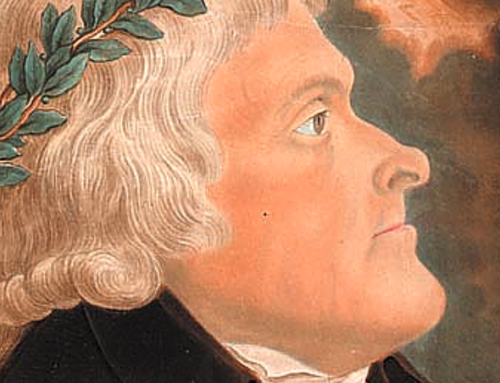Thomas Jefferson wrote several lists of advice about the virtuous life to his children, grandchildren, and the children of friends. The final list, which he called “A Decalogue of Canons for observation in practical life,” was sent during his retirement years from his beloved home of Monticello to Thomas Jefferson Smith, the son of his friend and admirer John Spear Smith, on February 21, 1825. The former President of the United States would die less than a year-and-a-half later, on July 4, 1826, the fiftieth anniversary of the adoption of the Declaration of Independence, of which he was the primary author. Below are reproduced the introductory part of the letter and the ten Canons.
Th: Jefferson to Th: Jefferson Smith. Monticello Feb. 21. 1825.
This letter will, to you be as one from the dead, the writer will be in the grave before you can weigh it’s counsels. your affectionate and excellent father has requested that I would address to you something which might possibly have a favorable influence on the course of life you have to run, and I too, as a namesake, feel an interest in that course. few words will be necessary with good dispositions on your part. adore God. reverence and cherish your parents. love your neighbor as yourself, and your country more than yourself. be just. be true. murmur not at the ways of Providence. so shall the life into which you have entered be the Portal to one of eternal and ineffable bliss. and if to the dead it is permitted to care for the things of this world, every action of your life will be under my regard. farewell.
A Decalogue of Canons for observation in practical life.
1. Never put off till tomorrow what you can do to-day.
2. Never trouble another for what you can do yourself.
3. Never spend your money before you have it.
4. Never buy a what you do not want, because it is cheap; it will be dear to you.
5. Pride costs us more than hunger, thirst and cold.
6. We never repent of having eaten too little.
7. Nothing is troublesome that we do willingly.
8. How much pain have cost us the evils which have never happened!
9. Take things always by their smooth handle.
10. When angry, count ten, before you speak; if very angry, an hundred.
The Imaginative Conservative applies the principle of appreciation to the discussion of culture and politics—we approach dialogue with magnanimity rather than with mere civility. Will you help us remain a refreshing oasis in the increasingly contentious arena of modern discourse? Please consider donating now.
The featured image is a detail from “The Writing Master” (1882) by Thomas Eakins and is in the public domain, courtesy of Wikimedia Commons.








Leave A Comment